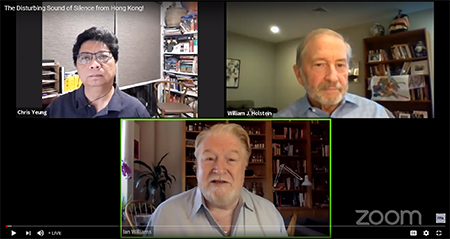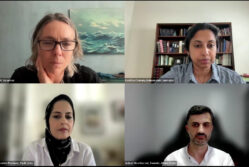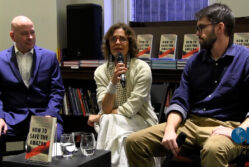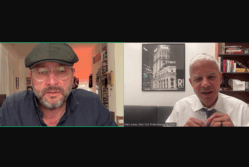Event Coverage Highlight

Hong Kong Journalist Paints Gloomy Picture for Press Freedom
Chris Yeung, chair of the Hong Kong Journalists Association, told the OPC and Foreign Press Association (FPA) on Nov. 23 that four months after a sweeping security law went into effect in Hong Kong in July, it has become clear that officials plan to carry out its restrictions in a “rigorous, aggressive manner.”
The OPC and FPA held a joint press conference with Yeung to discuss how the new security law and intensified Chinese pressure on Hong Kong is affecting reporting by both local and western media.
FPA President Ian Williams introduced the session, saying that China had used the distractions of the U.S. election and a crippling pandemic to tighten its control on Hong Kong, removing elected representatives simply because they favored democracy. When the FPA reached out to legislators to participate in the press conference, they declined for fear they might violate rules penalizing contact with foreigners.
When the national security law went into effect, some observers thought it might have been little more than a “paper tiger,” but after several cases demonstrating that police would enforce the law rigorously, it had become “a scary real tiger,” Cheung said.
“Media organizations and journalists are in particular worried that sooner or later, media will be a target,” he said, adding that those fears have been bolstered by public statements from officials including Hong Kong Chief Executive Carrie Lam who said “media is one of the sectors that she said should be ‘rectified.’ The other sectors are teachers and civil servants.”
Teachers had already been disqualified using the law, and civil servants are required to sign a declaration or take an oath of allegiance to the city. “This is seen as a kind of political vetting,” Yeung said.
The national security law includes an article calling for stepped-up regulation and supervision of media, Yeung added, saying it does not include details about how that might be carried out, “but we are expecting that the government will tighten control and regulation of the media.”
OPC Past President Bill Holstein, who once lived in Hong Kong, asked what mechanisms Hong Kong police were using to pressure local journalists. Yeung said that police are demanding IDs and accreditation for journalists covering protests, citing concerns about what they call “fake journalists” who might break laws during rallies.
“It’s a pretty gloomy picture. One positive sign is that journalists are still resilient here, and there’s still strong support for a free and independent press.”
Yeung said that some Hong Kong journalists have already moved out of the city, but “the overall fleet of journalists is still in relatively good shape here. But the spirit, the mood perhaps, the sentiments are quite bad. I would say it’s the worst time in many decades,” he said. “We have to speak out and get society’s support to defend our rights and freedoms.”
Of possible concern to both local and western journalists in Hong Kong is that china’s liaison office has become increasingly active in working with pro-china officials in Hong Kong and the Beijing-based ministry of foreign affairs has opened an office in Hong Kong to hold conversations with western journalists about their coverage of china, Cheung said. The mechanisms for repression, it seems, are being put into place. Well-known student activist leader Joshua Wong and two colleagues face sentencing soon are expected to receive prison terms. Long-time pro-democracy attorney martin lee also faces sentencing soon.




